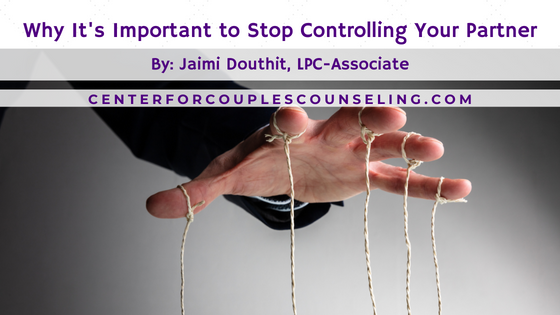Why It's Important to Stop Controlling Your Partner
I often work with couples in therapy who are so desperately trying to control something (or everything) about their partner and let me tell you, it doesn’t work. We cannot control our partner’s actions, thoughts or feelings-and really, do we want to? We chose our partner/s for who they are as an individual, so in theory we liked something about who they are! In reality, we want a fully capable partner who can make healthy and effective choices on their own as needed and participates in the relationship with the give and take that it requires.
When we are dedicated to changing something about our partner or who our partner is entirely, we are wasting energy that could otherwise be utilized somewhere more productive. Our partner is likely building up resentment that comes with not being accepted or loved for who they are. It’s important to set appropriate boundaries and goals within the relationship, but we cannot control anyone but ourselves.
The damage that can come from trying to control our partner comes in different shapes and sizes. We may see a partner lose their individuality, become overwhelmed and anxious with making decisions, become angry or resentful, and feel disconnected in the relationship. The goals of a healthy relationship include growing as an individual but coming together as a team where and when it matters. We want to see a couple thrive as individuals and within their relationship. This means we accept what we have total control over, what we have some control over, and what we have no control over. What are those things we can control, can somewhat control, and cannot control at all?
What we actually have control over:
-How we react to information or behaviors
-How we take care of ourselves
-How we communicate our wants, needs and frustrations
-If we utilize empathy and compassion in our interactions
-Whether or not we listen to our partner
-Our attitudes and mindsets
-How we talk to ourselves and others
-Our boundaries
-How much energy we dedicate to people and experiences
What we have some control over:
-What stressors impact our life
-The future
-Communication within our relationships
-Our schedules
-Where we put our energy
What we have no control over:
-Our partner’s opinions
-Our partner’s behavior
-How our partner communicates
-Our partner’s attitude or mindset
-World issues and events
-The past
-Our partner’s feelings and emotions
Accepting our limitations regarding control allows us to evaluate what we feel the need to control and to explore why we feel that way. This also helps us build a stronger relationship because we are loving our partner for who they are and practicing effective and healthy communication and compromise, encouraging a stronger bond, and increasing satisfaction within the relationship. If you come across something that you and your partner completely disagree on and struggle to communicate about, we strongly suggest bringing that topic to session so we can work together to process and discuss in a productive, healthy, and effective way.
Take time today and consider what you are wasting your energy on by trying to control something you really can’t control. Where else could that energy be utilized? How is this impacting your happiness as an individual and within your relationships? Is it worth it? This may be uncomfortable to explore and that’s okay - call us for a session, we are happy to help support you throughout this process. Good luck!

